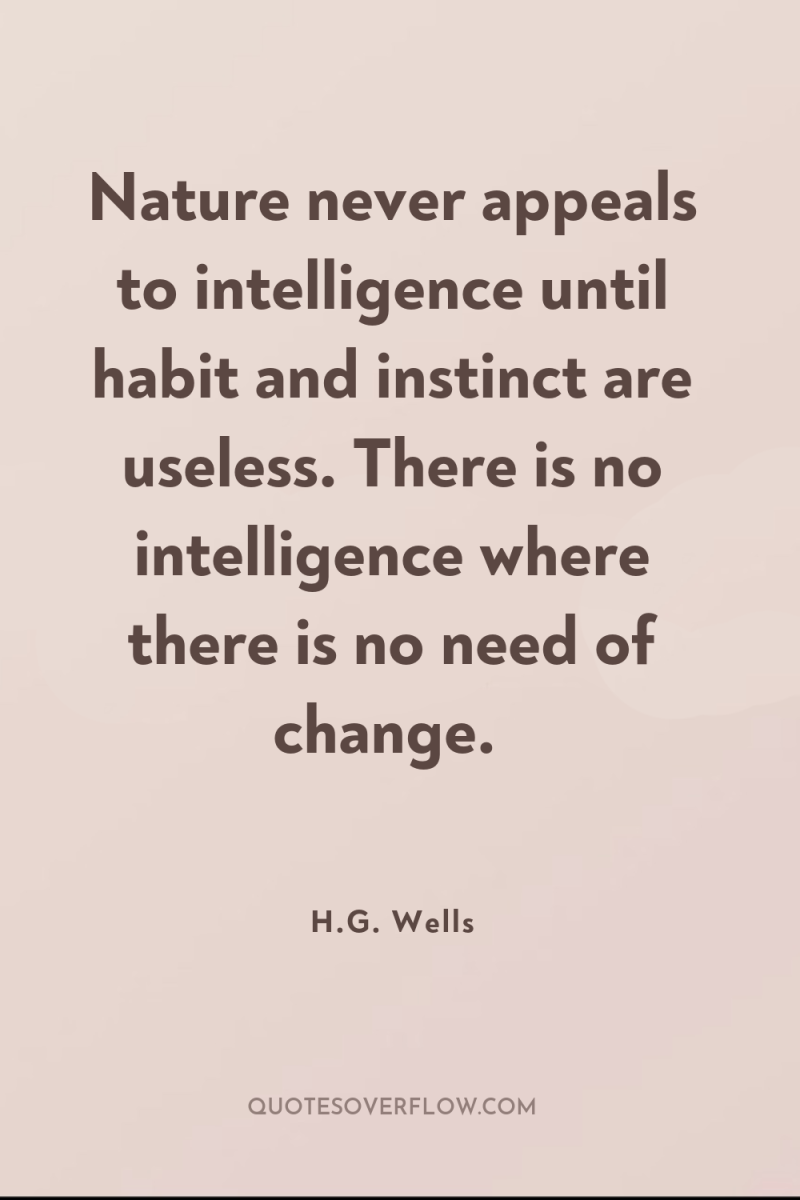
1
For after the Battle comes quiet.H.G. Wells

2
Nature never appeals to intelligence until habit and instinct are useless. There is no intelligence where there is no need of change.H.G. Wells
3
After all, the sanitation and the agriculture of today are still in the rudimentary stage. The science of our time has attacked but a little department of the field of human disease, but even so, it spreads its operations very steadily and persistently. Our agriculture and horticulture destroy a weed just here and there and cultivate perhaps a score or so of wholesome plants, leaving the greater number to fight out a balance as they can. We improve our favourite plants and animals--and how few they are--gradually by selective breeding; now a new and better peach, now a seedless grape, now a sweeter and larger flower, now a more convenient breed of cattle. We improve them gradually, because our ideals are vague and tentative, and our knowledge is very limited; because Nature, too, is shy and slow in our clumsy hands. Some day all this will be better organized, and still better. That is the drift of the current in spite of the eddies. .H.G. Wells
4
We should strive to welcome change and challenges, because they are what help us grow. With out them we grow weak like the Eloi in comfort and security. We need to constantly be challenging ourselves in order to strengthen our character and increase our intelligence.H.G. Wells
5
It is a law of nature we overlook, that intellectual versatility is the compensation for change, danger, and trouble. An animal perfectly in harmony with its environment is a perfect mechanism. Nature never appeals to intelligence until habit and instinct are useless. There is no intelligence where there is no change and no need of change. Only those animals partake of intelligence that have a huge variety of needs and dangers.H.G. Wells
6
I think that at that time none of us quite believed in the Time Machine. The fact is, the Time Traveler was one of those men who are too clever to be believed: you never felt that you saw all round him; you always suspected some subtle reserve, some ingenuity in ambush, behind his lucid frankness. Had Filby shown the model and explained the matter in the Time Traveller's words, we should have shown him far less skepticism. For we should have perceived his motives; a pork butcher could understand Filby. .H.G. Wells
7
We are kept keen on the grindstone of pain and necessity.H.G. Wells
8
My dear sir, that is just where you are wrong. That is just where the whole world has gone wrong. We are always getting away from the present movement. Our mental existences, which are immaterial and have no dimensions, are passing along the Time-Dimension with a uniform velocity from the cradle to the grave.H.G. Wells
9
The red tongues that went licking up my heap of wood were an altogether new and strange thing to Weena.H.G. Wells
10
So, in the end, above ground you must have the Haves, pursuing pleasure and comfort and beauty, and below ground the Have-nots, the Workers getting continually adapted to the conditions of their labour. Once they were there, they would no doubt have to pay rent, and not a little of it, for the ventilation of their caverns; and if they refused, they would starve or be suffocated for arrears. Such of them as were so constituted as to be miserable and rebellious would die; and, in the end, the balance being permanent, the survivors would become as well adapted to the conditions of underground life, and as happy in their way, as the Upper-world people were to theirs.H.G. Wells
11
It's against reason, " said Filby."What reason?" said the Time Traveller.H.G. Wells
12
But I was too restless to watch long; I'm too Occidental for a long vigil. I could work at a problem for years, but to wait inactive for twenty-four hours -- that's another matter.H.G. Wells
13
This has ever been the fate of energy in security; it takes to art and to eroticism, and then comes languor and decay.H.G. Wells
14
If only I had thought of a Kodak! I could have flashed that glimpse of the Under-world in a second, and examined it at leisure.H.G. Wells
15
In another place was a vast array of idols– Polynesian, Mexican, Grecian, Phoenician, every country on earth I should think. And here, yielding to an irresistible impulse, I wrote my name upon the nose of a steatite monster from South America that particularly took my fancy.H.G. Wells
16
All the sounds of man, the bleating of sheep, the cries of birds, the hum of insects, the stir that makes the background of our lives - all that was over.H.G. Wells
17
I had not, I said to myself, come into the future to carry on a miniature flirtation.H.G. Wells
18
What, unless biological science is a mass of errors, is the cause of human intelligence and vigour? Hardship and freedom: conditions under which the active, strong, and subtle survive and the weaker go to the wall; conditions that put a premium upon the loyal alliance of capable men, upon self-restraint, patience, and decision. And the institution of the family, and the emotions that arise therein, the fierce jealousy, the tenderness for offspring, parental self-devotion, all found their justification and support in the imminent dangers of the young.H.G. Wells